As we look ahead to 2025, key industry predictions highlight transformative advancements in automation, remote work technologies, and renewable energy sources. These trends are set to reshape business operations, influence workforce dynamics, and promote environmental sustainability. Additionally, shifts in consumer behavior towards sustainability and personalization will be driven by heightened awareness of environmental issues and technological innovations. The integration of artificial intelligence, blockchain, and the Internet of Things (IoT) will further enhance efficiency and security across various sectors, creating new opportunities for growth.
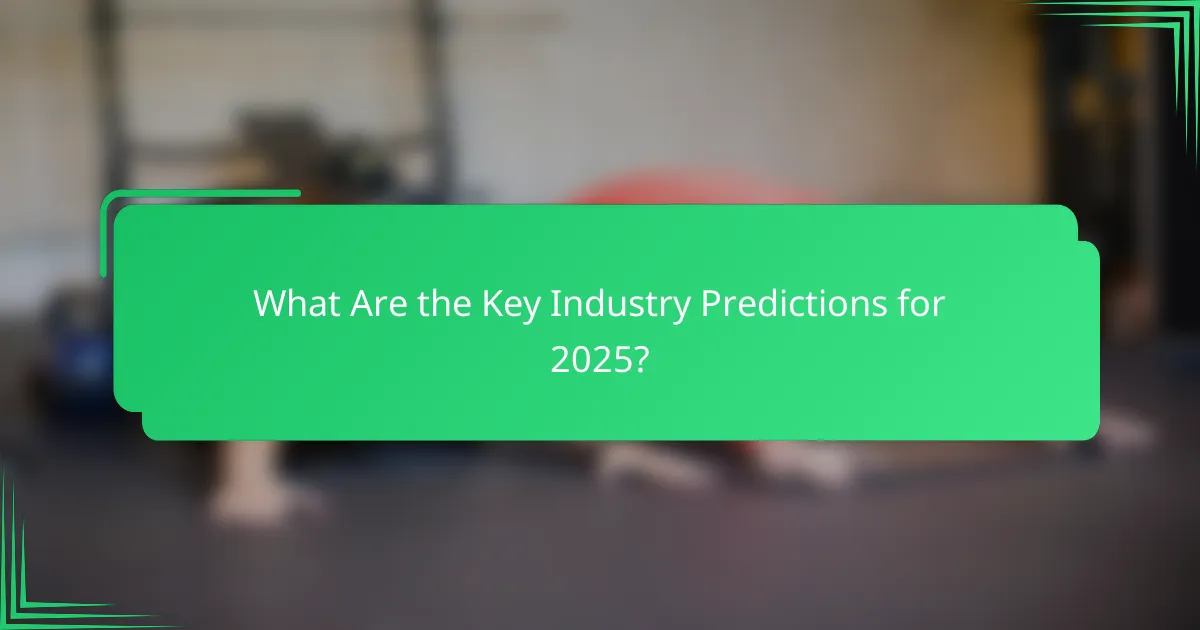
What Are the Key Industry Predictions for 2025?
Key industry predictions for 2025 indicate significant advancements in automation, remote work technologies, and renewable energy sources. These trends will reshape how businesses operate, influence workforce dynamics, and impact environmental sustainability.
Increased automation in manufacturing
By 2025, automation in manufacturing is expected to rise substantially, driven by advancements in robotics and artificial intelligence. Companies will likely adopt automated systems to enhance efficiency, reduce labor costs, and improve product quality.
Manufacturers should consider integrating smart technologies, such as IoT devices, to monitor production processes in real-time. This can lead to predictive maintenance, minimizing downtime and optimizing resource allocation.
However, businesses must also address potential challenges, such as workforce displacement and the need for retraining employees. A balanced approach that includes upskilling workers will be crucial for a smooth transition.
Growth of remote work technologies
The growth of remote work technologies is set to continue, with tools for collaboration, communication, and project management becoming more sophisticated. By 2025, many organizations will likely embrace hybrid work models, blending in-office and remote arrangements.
To effectively manage remote teams, companies should invest in reliable software solutions that facilitate seamless interaction and productivity tracking. Regular check-ins and virtual team-building activities can help maintain engagement and foster a cohesive work culture.
Employers should also be mindful of cybersecurity risks associated with remote work. Implementing strong security protocols and providing training on best practices will be essential to protect sensitive information.
Expansion of renewable energy sources
The expansion of renewable energy sources is anticipated to accelerate, driven by both regulatory pressures and consumer demand for sustainable practices. By 2025, investments in solar, wind, and other renewable technologies are expected to increase significantly.
Businesses should evaluate their energy consumption and consider transitioning to renewable sources to reduce their carbon footprint. Options may include installing solar panels or purchasing energy from green suppliers, which can also lead to long-term cost savings.
Additionally, staying informed about government incentives and subsidies for renewable energy projects can provide financial benefits. Companies that proactively adopt sustainable practices may enhance their brand reputation and attract environmentally conscious consumers.
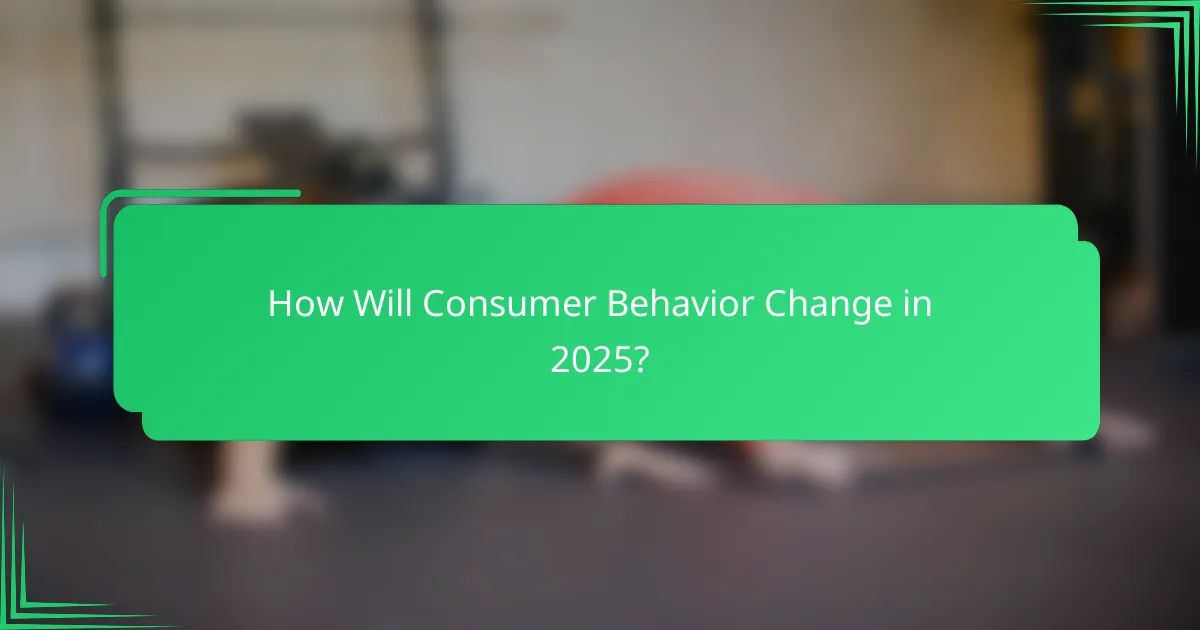
How Will Consumer Behavior Change in 2025?
In 2025, consumer behavior is expected to shift significantly towards sustainability and personalization. These changes will be driven by increasing awareness of environmental issues and advancements in technology that enable tailored experiences.
Shift towards sustainable products
The demand for sustainable products will grow as consumers become more environmentally conscious. Brands that prioritize eco-friendly materials and ethical sourcing will likely see increased loyalty and sales.
To adapt, companies should consider implementing sustainable practices such as reducing waste, using renewable resources, and ensuring fair labor conditions. For example, a clothing brand could switch to organic cotton and biodegradable packaging.
Additionally, transparency will be crucial. Brands that openly share their sustainability efforts and certifications, such as Fair Trade or ISO 14001, will attract more consumers who value ethical practices.
Increased demand for personalized experiences
In 2025, consumers will increasingly seek personalized experiences tailored to their preferences and needs. This trend will be fueled by advancements in data analytics and artificial intelligence, allowing brands to offer customized products and services.
Businesses should invest in technology that collects and analyzes consumer data to create targeted marketing strategies. For instance, a beauty brand might use customer purchase history to recommend products that align with individual skin types.
However, companies must balance personalization with privacy concerns. Clear communication about data usage and robust security measures will be essential to maintain consumer trust while delivering tailored experiences.

What Technologies Will Shape the Industry Landscape in 2025?
In 2025, the industry landscape will be significantly influenced by advancements in artificial intelligence, the rise of blockchain applications, and the integration of the Internet of Things (IoT). These technologies will drive efficiency, enhance security, and create new opportunities across various sectors.
Advancements in artificial intelligence
Artificial intelligence (AI) will continue to evolve, automating complex tasks and enabling data-driven decision-making. By 2025, businesses will increasingly rely on AI for predictive analytics, customer service automation, and personalized marketing strategies.
Companies should consider investing in AI tools that align with their operational needs. For instance, chatbots can enhance customer engagement while machine learning algorithms can optimize supply chain management. However, organizations must also be aware of ethical considerations and data privacy regulations when implementing AI solutions.
Rise of blockchain applications
Blockchain technology will gain traction as industries seek to improve transparency and security in transactions. By 2025, applications of blockchain will extend beyond cryptocurrencies, impacting supply chains, healthcare records, and digital identity verification.
Businesses should explore blockchain solutions that can streamline processes and reduce fraud. For example, using blockchain for tracking product provenance can enhance consumer trust. However, organizations must navigate regulatory frameworks and ensure interoperability with existing systems to maximize the benefits of blockchain.
Integration of Internet of Things (IoT)
The Internet of Things (IoT) will play a crucial role in connecting devices and gathering real-time data, leading to smarter operations. By 2025, industries will leverage IoT for enhanced monitoring, predictive maintenance, and improved customer experiences.
Companies should focus on implementing IoT solutions that provide actionable insights. For instance, smart sensors in manufacturing can predict equipment failures before they occur. However, it is essential to address security vulnerabilities and ensure robust data management practices to protect sensitive information in IoT ecosystems.
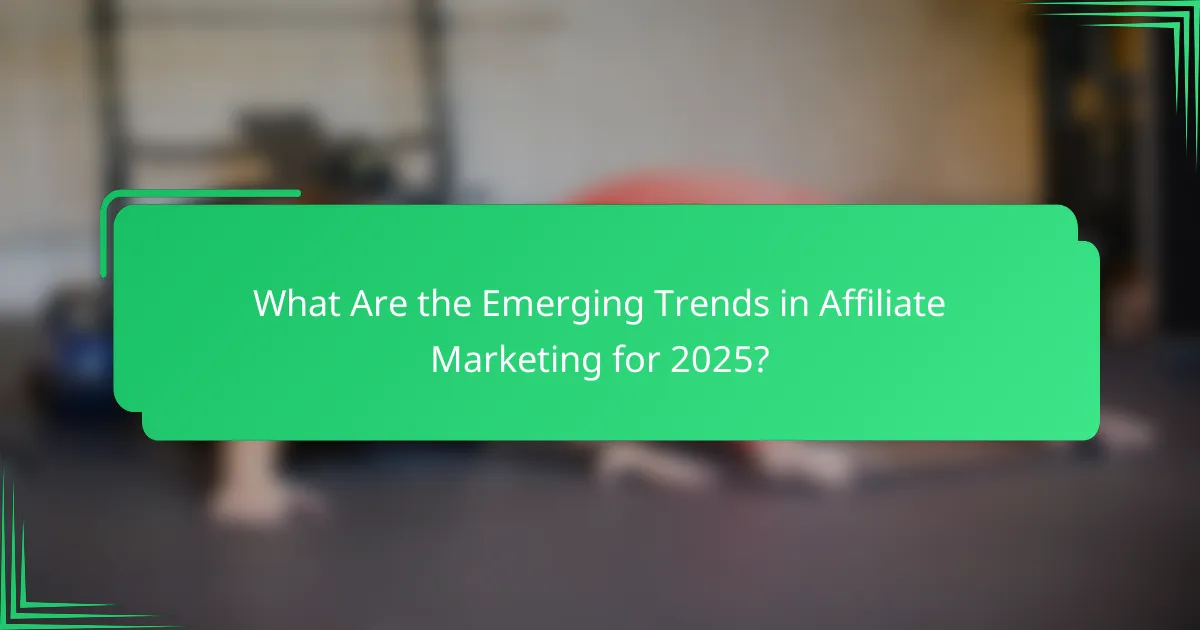
What Are the Emerging Trends in Affiliate Marketing for 2025?
Emerging trends in affiliate marketing for 2025 indicate a shift towards more personalized and strategic approaches, particularly through influencer partnerships and advanced AI technologies. These trends reflect the industry’s adaptation to consumer preferences and technological advancements.
Focus on influencer partnerships
Influencer partnerships are becoming a cornerstone of affiliate marketing strategies as brands seek authentic connections with their audiences. Collaborating with influencers allows companies to leverage their established trust and reach, making promotions more effective.
Brands should consider selecting influencers whose values align with their products to enhance credibility. Micro-influencers, in particular, often yield higher engagement rates and can be more cost-effective, making them a viable option for many businesses.
Utilization of AI for targeted marketing
The utilization of AI in affiliate marketing is revolutionizing how brands target potential customers. AI algorithms can analyze vast amounts of data to identify consumer behavior patterns, enabling marketers to create highly personalized campaigns that resonate with specific audiences.
Marketers should invest in AI tools that provide insights into customer preferences and optimize ad placements. This technology can significantly improve conversion rates by ensuring that the right message reaches the right audience at the right time, ultimately driving sales.
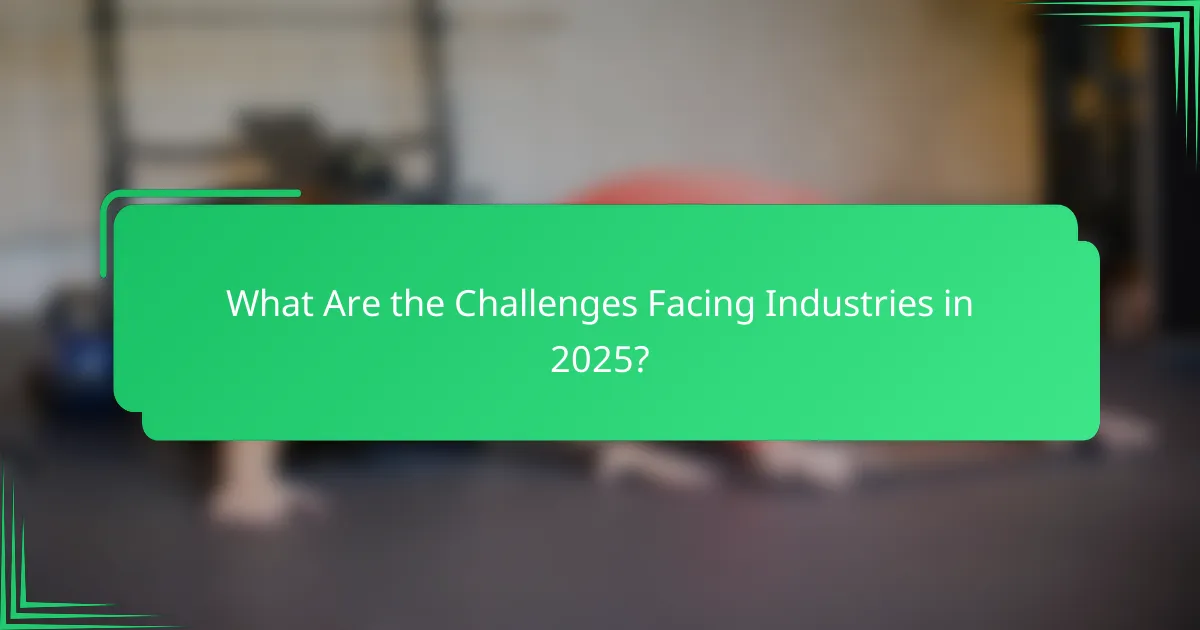
What Are the Challenges Facing Industries in 2025?
Industries in 2025 will face significant challenges, primarily due to supply chain disruptions and regulatory compliance issues. These factors will require businesses to adapt quickly to maintain efficiency and competitiveness.
Supply chain disruptions
Supply chain disruptions are expected to continue affecting industries in 2025, driven by geopolitical tensions, climate change, and evolving consumer demands. Companies may experience delays, increased costs, and shortages of critical materials.
To mitigate these disruptions, businesses should diversify their supplier base and invest in technology for better visibility and forecasting. For example, using real-time data analytics can help identify potential bottlenecks before they escalate.
Regulatory compliance issues
Regulatory compliance will become increasingly complex in 2025, with new laws and standards emerging across various sectors. Companies must stay informed about changes in regulations related to environmental impact, data protection, and labor practices.
To navigate these challenges, organizations should implement robust compliance programs that include regular training and audits. Engaging legal experts can also provide valuable insights into upcoming regulations and help avoid costly penalties.
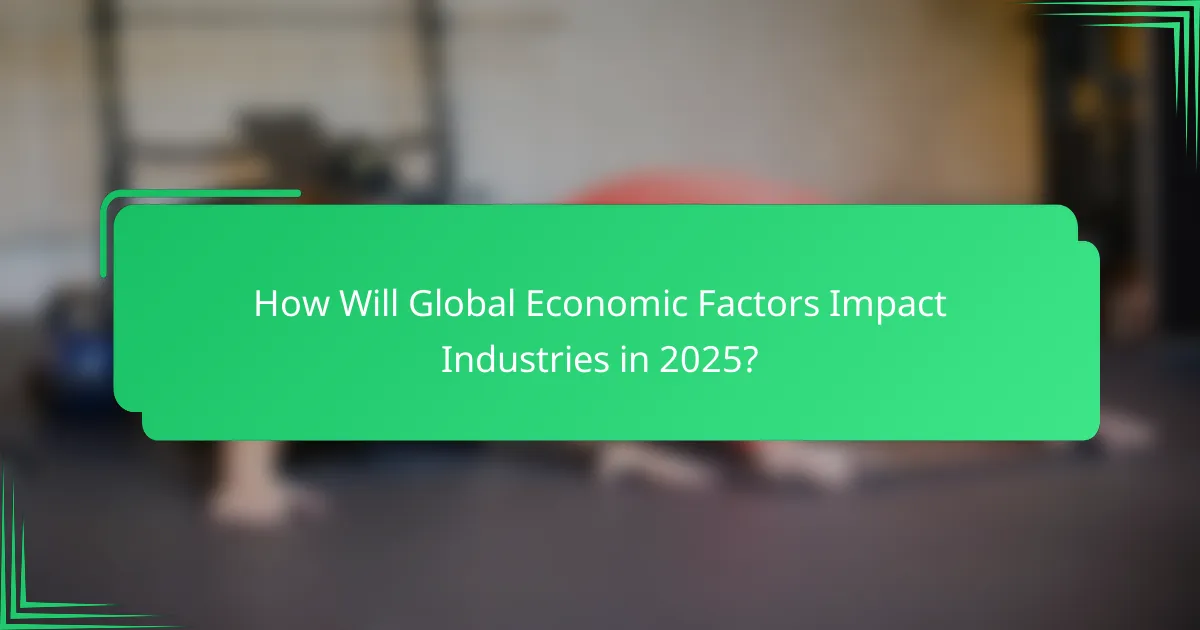
How Will Global Economic Factors Impact Industries in 2025?
Global economic factors will significantly shape industries in 2025, influencing everything from pricing to supply chain dynamics. Businesses must adapt to these changes to maintain competitiveness and profitability.
Inflation effects on pricing strategies
Inflation will compel industries to reassess their pricing strategies to maintain margins. Companies may need to implement gradual price increases or introduce tiered pricing models to accommodate rising costs while keeping customer loyalty intact.
For instance, in sectors like consumer goods, businesses might consider bundling products or offering discounts on bulk purchases to mitigate the impact of higher prices. Monitoring competitors’ pricing and customer responses will be crucial in this environment.
Impact of geopolitical tensions
Geopolitical tensions can disrupt supply chains and alter market access, forcing industries to rethink their operational strategies. Companies may need to diversify their supply sources or relocate production to more stable regions to minimize risks.
For example, firms in technology and manufacturing might explore partnerships in emerging markets to reduce dependence on any single country. Staying informed about international relations and trade agreements will be essential for strategic planning.

What Skills Will Be Essential for the Workforce in 2025?
In 2025, essential skills for the workforce will primarily include digital literacy, data analysis, and adaptability to new technologies. As industries evolve, employees will need to be proficient in using digital tools and interpreting data to make informed decisions.
Digital literacy and data analysis
Digital literacy involves the ability to effectively use technology and digital tools to communicate, collaborate, and solve problems. In 2025, this skill will be crucial as more businesses rely on digital platforms for operations and customer engagement.
Data analysis is equally important, as organizations will increasingly depend on data-driven insights to guide their strategies. Workers should be familiar with basic statistical concepts and tools like Excel or more advanced software such as Tableau or Python for deeper data exploration.
To enhance digital literacy and data analysis skills, consider enrolling in online courses or workshops that focus on practical applications. Regularly practicing with real-world data sets can also help solidify these skills, making you more competitive in the job market.


